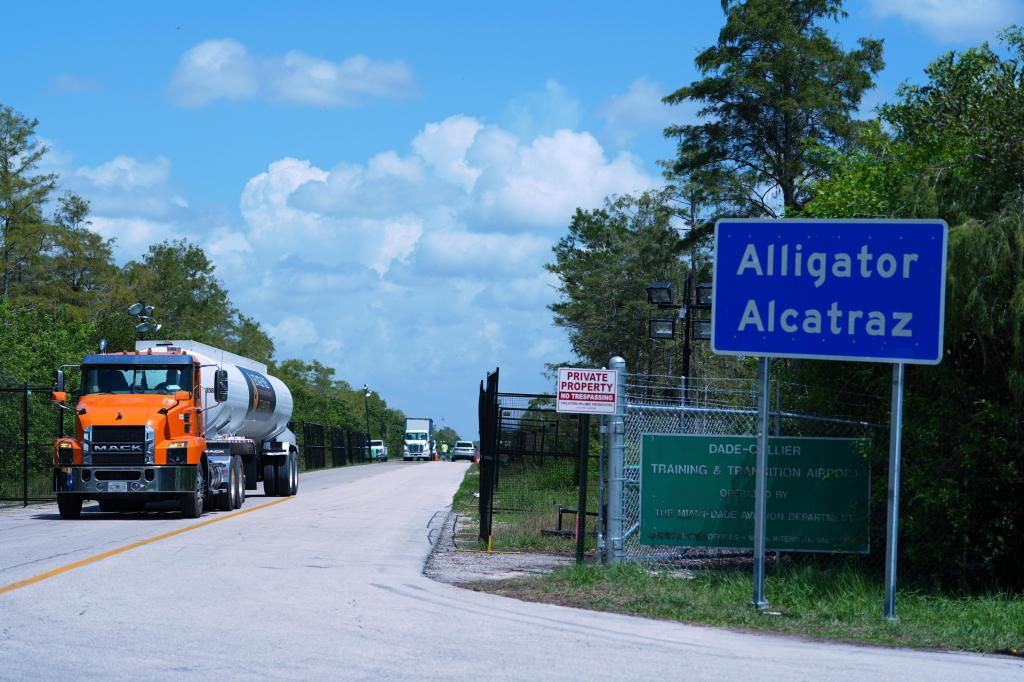Alligator Alcatraz is back in the news and it continues to plague Florida as a human-driven environmental crisis. With newly awarded FEMA funds, it’s now a problem for all Americans, costing us $608 million. Though this may be a drop in the bucket for some, consider the precedent that is being set. If FEMA grants every state such funds, we are looking at upwards of $30,400,000,000 for detention centers alone. What are cities and towns to do when faced with an environmental crisis like a wildfire, hurricane, or flood? Will the Federal Emergency Management Agency be capable of providing aid when they are busy pouring money into manufacturing problems through their support of immigration centers in highly sensitive ecosystems?
The award of federal funding also calls into question who is running the show. If this project is funded by the federal government, then the Center for Biological Diversity is correct in their assessment. A “federal project being built with federal funds that’s required by federal law to go through a complete environmental review.” There are reasons why we require environmental reviews. Checks and balances provide oversight and order, something that today many politicians seem to think they are above.
From the beginning, Alligator Alcatraz was a glaring environmental mistake. If you don’t trust the testimony of the expert scientists who have dedicated their lives to researching this environment or the Miccosukee residents who have called this land home for generation after generation, then turn to common sense. Paving over wildlands, bringing in more people (guards, staff and prisoners alike) has an impact.
 Rollins College Headshots Fall 2024
Rollins College Headshots Fall 2024
Victoria_Machado-2
To be more specific, the construction and ongoing operations of this detention center hurts an already sensitive landscape. The National Park Service highlights the Everglades as the largest subtropical wilderness in the United States. Home to more than 360 bird species, 27 different kinds of snakes, and iconic wildlife like the American crocodile, American alligator, West Indian manatee, and the Florida Panther, there is truly no place like this. Echoing the words of Marjory Stoneman Douglas, “The are no other Everglades in the world.”
The glades already contend with some of Florida’s major metropolitan areas — Palm Beach, Broward and Miami-Dade, in addition to Gulf Coast cities like Naples and Fort Myers. Concrete seems to grow fast in these highly desirable areas, weighing heavily on this critical habitat as more people result in more problems surrounding water management. The last thing the Everglades needed was a detention center plopped down in the middle of it. The longer it’s there, the greater the impact.
Apart from the politicians pushing this forward, it is unclear who benefits from Alligator Alcatraz — not everyday Floridians, not the locals, not the land. Certainly not the people inside who face questionable conditions to say the least — cages, insects, flooding, fecal waste overflow, health concerns. While the release of a detainee handbook may seem like a glimmer of humanitarian hope in a highly disorganized and dysfunctional system (recall that just a few weeks ago the Miami Herald reported missing people), instead it signifies something much larger. The handbook, which includes conditions and expectations for the facility and those inside, codifies rules hinting that Alligator Alcatraz, and other centers like it, are here to stay for the foreseeable future.
Our leaders today have an opportunity to avoid exacerbating a mounting environmental crisis — the further destruction of critical habitat and ecosystems that regulate life for the over five million people in Miami-Dade, Broward, Collier and Monroe counties, not to mention the critical nonhuman species who call this bioregion home. I urge Gov. Ron DeSantis and Attorney General James Uthmeier to turn their attention to the people they represent — the people who will be forced to clean up the mess of this detention center including the mismanaged water, the sewage and runoff, the destruction of habitat and wild spaces, and the unaccounted for people. For the sake of all Floridians, close Alligator Alcatraz.
Dr. Victoria Machado is a third-generation South Floridian and an assistant professor of Environmental Studies at Rollins College.
